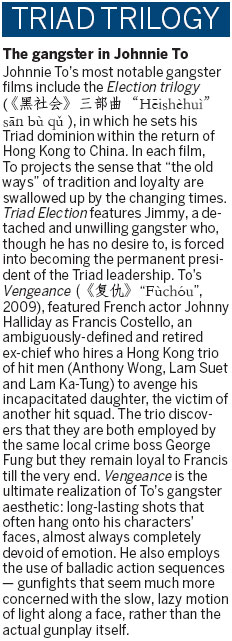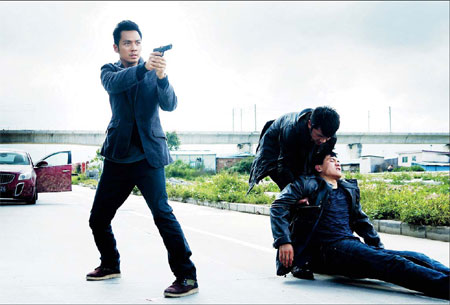Dark side of a city
Updated: 2013-09-06 09:31
By Terence Hsieh (China Daily)
|
|||||||||||
Director looks to break the mould with gritty tale
Director Johnnie To (杜琪峰) remains a controversial figure in intellectual film circles for being seemingly inconsistent in mood and melody in his films. Still, he is considered a directorial auteur for staying true to his methods during periods in which style and even technique have dramatically altered.
To's work almost always encompasses the constantly changing nature of Hong Kong. While some focus on his earlier happy-go-lucky romantic comedies, others focus on his dark and bleak crime noirs that reinterpret the nature of the Chinese Triad (三合会 Sān hé huì ) gangster in an ironic and nihilistic light.
In many ways, To's aesthetic is modified for Drug War, his first foray into the mainland film industry. Drug War is set in Tianjin, and prominently features veteran Chinese actor Sun Honglei (孙红雷) as a narcotics special division police captain Zhang Lei, To-film veteran Louis Koo (古天乐) as ambiguous drug dealer Timmy Choi, and Crystal Huang (黄奕) as Zhang's right hand agent.
Timmy is captured by the narcotics division and agrees to help end the cocaine-smuggling drug ring on the condition that he is spared the death penalty, although he plays both sides against each other throughout the film.
To provides a glimpse of Tianjin that most people will have never seen on the Chinese silver screen: a gritty, filthy and sprawling city with all the industrial glamour of a hunk of coal. There are no gleaming malls, glamorous apartment buildings or glitzy actresses. Instead, Drug War finds itself worming through decrepit makeshift warehouses, sprawling highways and crusty harbors, all conveyed in a bleak gray that reeks of pollution.

Drug War is To's attempt to not only redirect the topical taboos in Chinese cinema but also reinterpret the shooting locations in mainland cinema, giving us a nuanced, even negative, perception of a fatally-flawed, industrial Tianjin.
In light of To's corpus of work, Drug War finds itself surprisingly light on action; more time is spent in hotel rooms and highways interrogating and investigating criminals than on gunfights. However, Drug War ends in a gunfight between police and the antagonist drug dealers, during which the dead pile up on both sides.
Captain Zhang: This is your cellphone. The passengers in that car have called you 33 times. Why? We found your drug factory on
Lishuang Road. There was an explosion that killed two men and one woman. The woman was your wife. The two men were her brothers. What do you have to say about this?
Zhè shì nǐ de shǒujī, huòchē shàng de rén yòu gěi nǐ dǎ le sānshísān cì. Zěnme huí shì a? Wǒmen zài lí shuāng lù zhǎodàole nǐ de zhì dú gōngchǎng. Bàozhà sǐle liǎng nán yī nǚ, nǚ de shì nǐ de lǎopó, nán de shì tā de liǎng gè gēge. Néng liáo ma?
这是你的手机,货车上的人又给你打了三十三次。怎么回事 啊?我们在梨双路找到了你的制毒工厂。爆炸死了两男一女,女的是你的老婆,男的是她的两个哥哥。能聊吗?
Even so, the shootouts still erupt with the control and command of a Johnny To film - cutting from distantly-angled views in order to create a sense of detachment from the explosions to character close-ups that feature flying sparks and clattering expended bullet shells. While one would expect gun fighting gangsters to spit, grit and grin, To's action sequences always feature actors shooting each other in grim, emotionless silence.
Louis Koo is the Drug War's greatest asset; as Timmy, a drug dealer-turned-informant, his role as a friend/foe is contested until the very end. We're sure he can be trusted, but as soon as we are, he flips the tables. His motivations and identity are completely opaque, the residual burned-out husk with which To often eloquently masks his characters. Even when he reveals them, we still remain suspicious.
Timmy: I've already cooperated with you on everything and saved you again and again! If you don't believe, then don't arrest Haha Brother and Li Zhenbiao!
Wǒ yǐjīng hézuòle, jiùle nǐ yīcì yòu yīcì. Rú Guǒ nǐ hái pà wǒ shuǎhuāzhāo er, nǐ bié zhuā hāhā gē, Bié zhuā lí zhèn biāo!
我已经合作了,救了你一次又一次。如果你还怕我耍花招儿,你别抓哈哈哥,别抓黎振标!
While Timmy is willing to help Captain Zhang in the capture of some of his fellow operators, it becomes apparent that saving his own hide is his priority, even going so far as to tip off other drug lords as to the police presence.
Drug seller: What the hell are you doing?
Nǐ gǎo shénme guǐ ya?
你搞什么鬼呀?
Timmy: Don't look.
Bùyào kàn.
不要看。
Drug seller: At what?
Kàn shénme?
看什么?
Timmy: You'll be scared.
Pà nǐ hàipà.
怕你害怕。
Drug seller: Scared of what?!
Pà shénme?
怕什么?
Timmy: The car in front of us and the three cars to the rear are all police.
Qiánmiàn nà liǎng liàng hé hòumiàn nà sān liàng chē dōu shì jǐngchá.
前面那两辆和后面那三辆车都是警察。
While Drug War perhaps isn't To's best film, mainlanders will see it as auteur for its edgy content, style, and mood. To's films have always inhabited the space between then and now: the associated loss and gain of ideals and morals that comes with change in circumstance within the confines of political and social identity. Indeed, the film riddles the air rife with implications beyond the cinematic: Instead of trying to preserve an image, To challenges the rest of the country to reexamine its culture as suspended in an ever-shifting sea of influences. To's often cited "chameleonic" thesis is then perfectly clear-from romance to gangster films - why stay true to one aesthetic when times call for different styles? It is in this light that Johnnie To is the catalyst, the perfect director of China's first truly edgy blockbuster - a film that not only resets the discourse on taboo, but on culture itself.
Courtesy of The World of Chinese,
www.theworldofchinese.com
The World of Chinese
|
Police officers take on gangsters in the movie Drug War. Provided to China Daily |
(China Daily European Weekly 09/06/2013 page27)
Today's Top News
List of approved GM food clarified
ID checks for express deliveries in Guangdong
Govt to expand elderly care
University asks freshmen to sign suicide disclaimer
Tibet gears up for new climbing season
Media asked to promote Sino-Indian ties
Shots fired at Washington Navy Yard
Minimum growth rate set at 7%
Hot Topics
Lunar probe , China growth forecasts, Emission rules get tougher, China seen through 'colored lens', International board,
Editor's Picks

|

|

|

|

|

|






